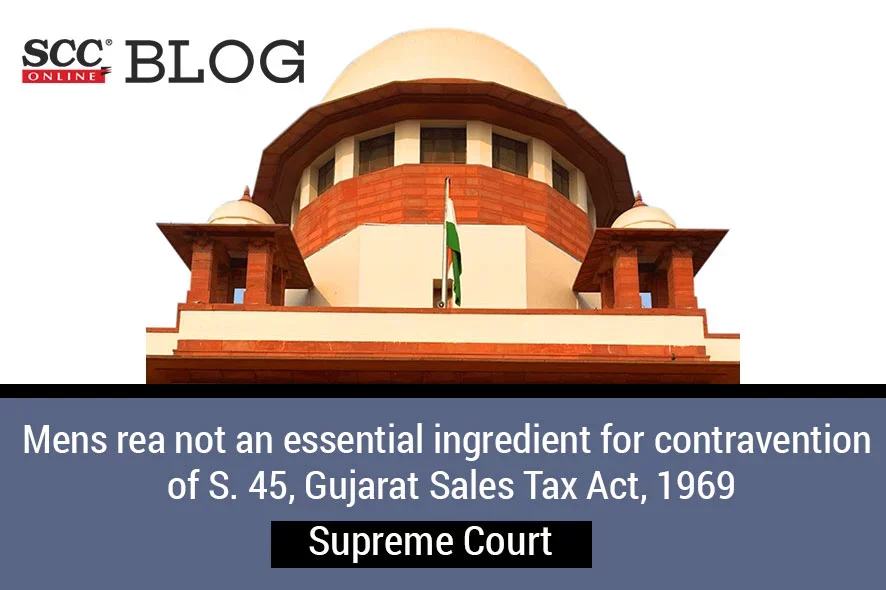Supreme Court: The Division Bench of M.R. Shah* and B.V. Nagarathan, JJ. contemplated the question that while imposing/levying penalty and interest leviable under Section 45(6) and Sec. 47(4A) of the Gujarat Sales Act, 1969, mens rea on the part of Assessee whether required to be considered. The Supreme Court while allowing the present appeal and quashing the impugn judgment of the High Court of Gujarat, held that penalty and interest leviable under the said sections are statutory and mandatory and no other words like mens rea and/or satisfaction of the assessing officer and/or other language used in the Sections.
Factual Matrix
Assessee was engaged in the business of executing indivisible works of undertaking contract of coal tar and enamel coating on pipes and opted for payment of lumpsum tax as provided under Section 55-A of the Gujarat Sales Tax Act, 1969 and deposited tax at the rate of 2% on sales.
Assessing Officer (AO) levied the penalty and interest against the Assessee under the provisions of Section 45(6) and Sec. 47(4A) of the Act, 1969, which was confirmed by the tribunal.
Eventually, the High Court set aside the levy of penalty and interest confirmed by the tribunal, mainly on the grounds that the tax imposed had already been paid and that the Assessee was under a bonafide opinion as to its tax liability and was following expert advice and therefore, paid the tax at the rate of 2%.
According to the High Court, though not specifically mentioned/opined, there was no mens rea on the part of the Assessee in not paying the tax at the rate of 2% and in making the payment of the tax at 2%.
Contentions
The State vehemently argued that while deleting the penalty, the High Court has not at all considered sub-section (6) of Section 45 of the Act, 1969 in its true spirit. It was the case of the petitioner that the penalty levied is a statutory penalty and hence, compulsory. State further argued that Commissioner or any other authority has no discretion to levy or not as long as the Assessee falls under Section 45(5) of the Act, 1969 and phrase used in sub-section (6) of Sec 45 is “shall be levied”.
The State further drew attention of the Court on the point that in cases where the penalty is a statutory penalty, there is no requirement to prove mens rea or to consider the aspect regarding bonafide belief of the Assessee while computing payment of penalty and interest.
On the contrary the Asseessee submitted that Section 45(5) creates a presumption which is rebuttable in nature and for the purpose of imposition of penalty under Section 45(6), mens rea, blameworthy conduct, deliberate violation, evil doing, fraud, suppression (either one or more of them) must be proved.
Analysis and Decision
The Court opined that from the language of Section 45(6) of the Act, it can be seen that the penalty leviable under the said provision is a statutory penalty and the moment it is found that a dealer is to be deemed to have failed to pay the tax to the extent mentioned in sub-section (5), the penalty is automatic. It was further observed that no other word like mens rea and/or satisfaction of the assessing officer and/or other language is used like in Sec. 11AC of the Central Excise Act hence, was a well settled principle in law that the Court cannot read anything into a statutory provision which is plain and unambiguous.
The Supreme Court while relying on State of Gujarat v. Arcelor Mittal Nippon Steel (India) Ltd., (2022) 6 SCC 459, opined that there is no discretion with the assessing officer either to levy or not to levy and/or to levy any penalty lesser than what is prescribed/mentioned in Section 45(6) of the Act, 1969. Hence, there is no question of considering any mens rea on the part of the assessee/dealer.
[State of Gujarat v. Jindal Saw Ltd., 2023 SCC OnLine SC 428, decided on 17-04-2023]
*Judgment authored by Justice M.R. Shah
Advocates who appeared in this case :
For the Appellant/ State: Ms. Aastha Mehta and Ms. Deepanwita Priyanka, Advocates;
For the Respondent/ Assessee: V. Lakshmikumaran, Advocate.







